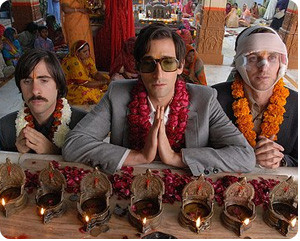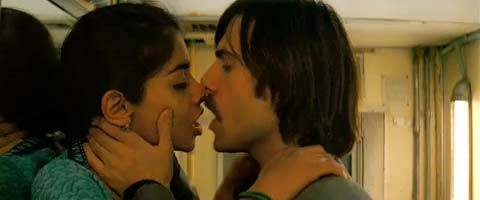In the Blog
wes anderson: the ultimate heartbreaker
Pssst! This post has been updated.

Have you ever woken up one morning and suddenly realised that an old and cherished friend doesn’t care about you or anything you represent, and actually either ignores or caricatures your existence?
Well, neither have I. But too many times I’ve realised that a director (or musician or writer or artist…) that I love like a friend actually creates art that exoticises, fetishises, or all out erases who I am.
I’ve managed to recover from the horror of finding that much of the music I used to like is grossly sexist, (see our little blurb about Jessica Hopper’s famous article on emo music here) but I’m still working on getting over my ex-friend Wes Anderson.
Before I identified as a woman of colour and started applying anti-oppression criticism to every inch of pop culture I could get my hands on, I loved Wes Anderson. But in my grand old age, I can’t excuse the racist caricatures that populate all of his movies.
Like Pagoda, the cute little Indian man in the Royal Tenenbaums (who also appears in Bottle Rocket and Rushmore) who exists solely to do Royal’s bidding, and has an adorable lack of morality. Or the slew of characters of colour - the Brazilian David Bowie (played by Seu Jorge who actually has quite an illustrious film and recording career); Vikram Ray, whose character’s main feature is that he was “born on the Ganges”; the Filipino pirates - in The Life Aquatic.
Characters of colour in Anderson’s films are always caricatures, hilariously exotic. Anderson uses “race as a novelty”, says salon.com, “suggesting an assertively white-kid view of the world.”
These characters are funny not because of their personalities or life situations - unlike Anderson’s white characters - but solely because they’re brown. It’s like Anderson is saying, “The pirates are Filipino! How hilarious is that??” Needless to say, I don’t get the joke.
As if that isn’t bad enough, Anderson also uses Asian cultures to demonstrate just how educated and well-travelled he is. It’s like the movie equivalent of “Some of my best friends are Laotian” and “I went backpacking in Vietnam.” The master of in-joke filmmaking, Anderson’s brown characters are like an inside joke for urban hipsters who’ve visited Little India a few times.
While Anderson devotees have brushed off criticisms of characters like Pagoda as being minor, and few and far between, it seems like things are about to get a lot worse:

Fox Searchlight
Last week, Anderson’s new film The Darjeeling Limited opened. The film is the story of three American brothers who travel to India together after their father dies. Maybe I’m being prematurely judgemental, but the Darjeeling Limited looks suspiciously like “Pagoda: The Movie.”
It’s this that really gets my back up about the Darjeeling Limited:

This is what really breaks my heart: Wes’ track record with women of colour. Anderson just loves pairing women of colour up with dorky white dudes, shortly after dorky white dudes have been dumped or rejected by white ladies. Even though Rushmore’s Margaret Yang is the fullest of all of Wes’ colour characters, she is still paired up with the loveable/hateable Max after Ms Cross turns him down. It’s the same story with Inez, the lovely Latin American hotel cleaner in Bottle Rocket.
Once upon a time, when it was illegal in Canada for non-white men to marry white women (incidentally it was only in the 60’s that those laws were repealed both in the US and Canada), I imagine images of interracial relationships were radical statements. But these days, you can’t swing a cat in urban North America without stumbling across some form of cultural appropriation.
The interracial relationships in Anderson’s films are not radical. They simply reinforce racism’s most current and insidious form - they take cultural appropriation to the ultimate level by appropriating actual women of colour, a la Gwen Stefani.
In the words of Racialicious.com, Darjeeling Limited (and, according to me, aspects of all of Anderson’s films) looks like it falls into “the time-honored genre of White People Working Out Their Issues Against an Exotic Backdrop.” Still, I’d like to say for the record that I don’t think Anderson consciously sets out to reduce his non-white characters to ridiculous stereotypes, who are used only to enhance his white characters, and never allowed to stand on their own.
But the fact that the only role that people of colour can have in his movies are as sexual fantasies, sidekicks or deeply insulting cartoons suggests that, consciously or subconsciously, Anderson doesn’t think that much of real life people of colour. And between you and me, I’m not sure mine and Wes’ friendship can withstand that.
I know I sound bitter. But it’s hard to get over such a betrayal. As a liberal arts student in the early ’00s with a tendency towards hipsterism, I adored Wes’ movies. At 17 I sneaked into Rushmore, at 19 I memorised all the dialogue to Bottle Rocket, and at 20 The Royal Tenenbaums pulled me out of an extended case of the blues, and maybe, just maybe, preventing me from dropping out of university.
Anderson’s beautifully filmed and bizarre characters, who somehow made madness, dysfunctional families and alienation seem not only manageable but funny, were like friends who reminded me that I wasn’t alone. There were many times that Anderson’s movies comforted me with the message that yes, everyone gets lonely, and yes, there are still reasons to live through it. It was like Wes really got me.
But here’s the thing about Wes Anderson: he positions himself as an outsider, and his protagonists are always outsiders, painfully awkward and deeply deficient in social skills but also desperately seeking love (and you will notice that his white characters are capable of longing for love in a much more profound way than his characters of colour will ever acheive). But at the end of the day, what is so outsider about Wes? He’s an extremely succesful, wealthy, white dude. That’s not to say that rich white dudes can’t ever feel alienated. But to position yourself as an outsider, while making art that ensures that people of colour are truly outside, is obscenely fake.
There’s few things more horrible in pop culture than discovering that someone who let you inside is actually determined to keep you outside. Does anybody else have sob stories of artists they revered, who turned out to be total, oppressive jerks?
My mum always tells me to stay away from toxic friendships. In that vein, I’m not even sure I’m going to rent The Darjeeling Limited.
Wes, don’t even try to Facebook me. It’s time we both accepted it: it’s over.
Update!: Ooo, look, slate.com agrees with me. Read this great critique of Anderson’s upper-class white characters and working class characters of colour here.



